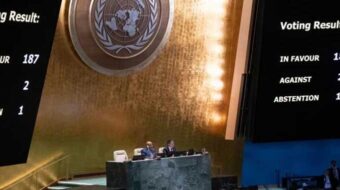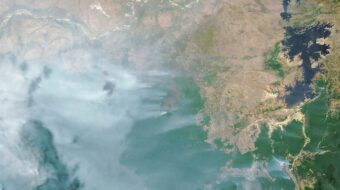
The governments of Cuba and Venezuela denounced the acquittal of Luis Posada Carriles, 83, on all 11 counts of perjury, obstruction of justice and immigration violations in a federal court in El Paso, Texas, April 9. Both governments renewed demands that Posada be extradited to Venezuela to stand trial for the 1976 bombing of a Cuban civilian airliner, in which all 73 people on board died.
The Cuban Foreign Ministry stated, “For all those who have followed the shadowy trajectory of the terrorist and his connections with successive U.S. administrations…and their dirty war against Cuba, this is another demonstration of the support and protection which the U.S. government has historically given him”.
Posada, a Cuban exile, was used by the CIA as a key operative in the United States’ long running effort to overturn the Cuban Revolution. He also carried out much dirty work for the CIA in other parts of Latin America.
A suspiciously short time before the 1976 airline bombing, Posada supposedly ceased his connection with the CIA and was working for Venezuelan state security, and then as a private detective. Arrested after other anti-Castro agents fingered him as the co-mastermind of the bombing, Posada was tried by a military court in Venezuela and acquitted. He was awaiting trial in a civilian court when he escaped in 1985, and moved his operations to Central America, where he again helped the CIA during the bloody “Contra Wars”.
In 1997, Posada was implicated in a series of bombings in Havana, in one of which an Italian tourist, Fabio de Celmo, was killed. In a series of interviews with New York Times reporter Anna Louise Bardach, Posada confirmed his involvement in these bombings, stating that their purpose was to frighten away tourists. In Cuba, several of Posada’s collaborators in the bombings were put on trial and have also confirmed this, though Posada later retracted the boast. The U.S. government was well aware of Posada’s activities through its own files and through information provided by Cuban agents to the FBI.
In 2000, Posada and several associates were arrested in Panama as they planned to blow up a university auditorium where then President Fidel Castro of Cuba was to speak. Posada was convicted but was pardoned by then President Mireya Moscoso of Panama, who is closely connected to the Miami Cuban exiles.
In 2005, Posada slipped into the United States illegally and was arrested. An immigration judge ruled that he could not be deported to Venezuela or Cuba because one of his cronies claimed he would be tortured. He applied for U.S. citizenship in 2005, and was prosecuted for lying in the citizenship interview. The charges were thrown out by Judge Kathleen Cardone, who accused immigration authorities of trying to entrap Posada. This was reversed by an appeals court in 2008, and the case was sent back to Cardone.
So that led to the trial that ended April 9. Washington, D.C., attorney José Pertierra, representing the Bolivarian Republic of Venezuela, observed the whole trial and has left us a very lively and complete account in his “El Paso Diary.”
A number of Judge Cardone’s rulings, especially regarding what evidence the jury could not see or hear, left federal prosecutors fuming. Jurors were not allowed to see a key fax that revealed the money trail between New Jersey Cuban exiles and Posada’s operations in Central America. After the defense presented evidence that a key prosecution witness had suffered from psychiatric problems, Cardone would not allow the prosecution to introduce evidence from another psychiatrist that he was sane. Cardone allowed witnesses many claimed were outrageously unqualified to address the jury and pontificate at length about political issues unrelated to the trial.
Former Assistant Secretary of State Otto Reich used his time as a defense witness to make wildly unsupported statements having absolutely nothing to do with the case against Posada. Mr. Reich also was allowed to give his “expert” opinion that another key witness, New York Times writer Bardach, is prejudiced against Cuban exiles, implying that her account of what Posada told her about the 1997 bombings could have been false. The judge allowed Reich to qualify as an expert witness because he had done work related to Cuba under the Reagan and George W. Bush administrations, though this work included concocting misleading propaganda. The purpose of Reich’s testimony and that of several other defense witnesses was to whip up anti-Cuba sentiments, thereby discrediting the Cuban police and forensic witnesses who had testified earlier, as well as Ms. Bardach.
The strategy worked. In spite of eleven weeks of impressive testimony by the prosecution’s witnesses, the jury took just three hours to acquit.
Posada cannot be tried again on the same charges, but he could be prosecuted for terrorism, as required by international law. Or he could be extradited to Venezuela, as the Venezuelan government has demanded (the Cuban government is deferring to Venezuela in this matter; Posada is a naturalized Venezuelan citizen and was based in Venezuela when the airliner bombing took place). But Posada and his supporters have gloated that if the United States ever got serious about trying him, he would reveal things about his past association with the CIA that Uncle Sam would rather the world did not know.
So it is unlikely that Posada will be tried in the U.S. for the airliner bombing. This means that the only chance that he would face real justice is if he were extradited to Venezuela.
At stake is the U.S. government’s claim that it is serious about fighting terrorism.
Photo: Steev Hise // CC BY-NC-SA 2.0












Comments